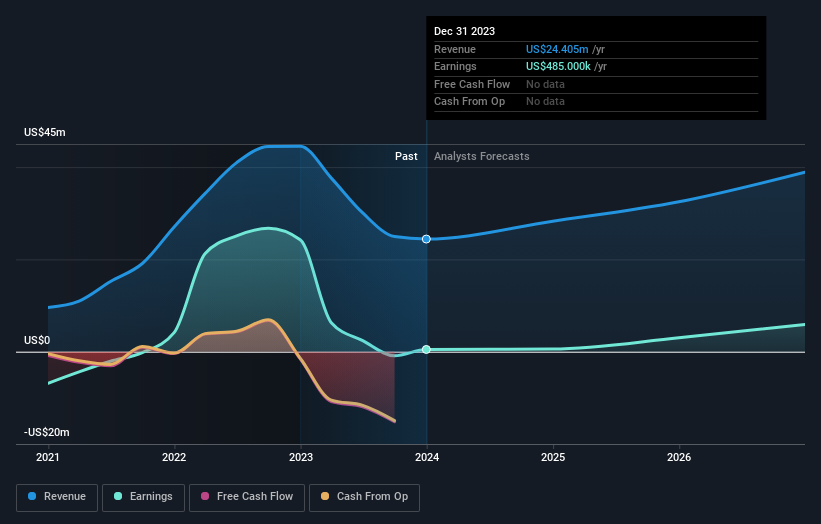Sensus Healthcare, Inc. Beat Analyst Profit Forecasts, And Analysts Have New Estimates
Shareholders will be ecstatic, with their stake up 23% over the past week following Sensus Healthcare, Inc.'s (NASDAQ:SRTS) latest annual results. It was overall a positive result, with revenues beating expectations by 2.1% to hit US$24m. Sensus Healthcare also reported a statutory profit of US$0.03, which was a nice improvement from the loss that the analysts were predicting. Earnings are an important time for investors, as they can track a company's performance, look at what the analysts are forecasting for next year, and see if there's been a change in sentiment towards the company. We thought readers would find it interesting to see the analysts latest (statutory) post-earnings forecasts for next year.
Check out our latest analysis for Sensus Healthcare
Taking into account the latest results, the most recent consensus for Sensus Healthcare from four analysts is for revenues of US$28.3m in 2024. If met, it would imply a decent 16% increase on its revenue over the past 12 months. Statutory per-share earnings are expected to be US$0.03, roughly flat on the last 12 months. Yet prior to the latest earnings, the analysts had been anticipated revenues of US$28.7m and earnings per share (EPS) of US$0.052 in 2024. So there's definitely been a decline in sentiment after the latest results, noting the pretty serious reduction to new EPS forecasts.
Despite cutting their earnings forecasts,the analysts have lifted their price target 19% to US$7.13, suggesting that these impacts are not expected to weigh on the stock's value in the long term. That's not the only conclusion we can draw from this data however, as some investors also like to consider the spread in estimates when evaluating analyst price targets. Currently, the most bullish analyst values Sensus Healthcare at US$8.00 per share, while the most bearish prices it at US$6.00. Even so, with a relatively close grouping of estimates, it looks like the analysts are quite confident in their valuations, suggesting Sensus Healthcare is an easy business to forecast or the the analysts are all using similar assumptions.
One way to get more context on these forecasts is to look at how they compare to both past performance, and how other companies in the same industry are performing. It's clear from the latest estimates that Sensus Healthcare's rate of growth is expected to accelerate meaningfully, with the forecast 16% annualised revenue growth to the end of 2024 noticeably faster than its historical growth of 9.5% p.a. over the past five years. Compare this with other companies in the same industry, which are forecast to grow their revenue 7.9% annually. Factoring in the forecast acceleration in revenue, it's pretty clear that Sensus Healthcare is expected to grow much faster than its industry.
The Bottom Line
The most important thing to take away is that the analysts downgraded their earnings per share estimates, showing that there has been a clear decline in sentiment following these results. Happily, there were no major changes to revenue forecasts, with the business still expected to grow faster than the wider industry. There was also a nice increase in the price target, with the analysts clearly feeling that the intrinsic value of the business is improving.
Keeping that in mind, we still think that the longer term trajectory of the business is much more important for investors to consider. We have forecasts for Sensus Healthcare going out to 2026, and you can see them free on our platform here.
You should always think about risks though. Case in point, we've spotted 3 warning signs for Sensus Healthcare you should be aware of.
Have feedback on this article? Concerned about the content? Get in touch with us directly. Alternatively, email editorial-team (at) simplywallst.com.
This article by Simply Wall St is general in nature. We provide commentary based on historical data and analyst forecasts only using an unbiased methodology and our articles are not intended to be financial advice. It does not constitute a recommendation to buy or sell any stock, and does not take account of your objectives, or your financial situation. We aim to bring you long-term focused analysis driven by fundamental data. Note that our analysis may not factor in the latest price-sensitive company announcements or qualitative material. Simply Wall St has no position in any stocks mentioned.

